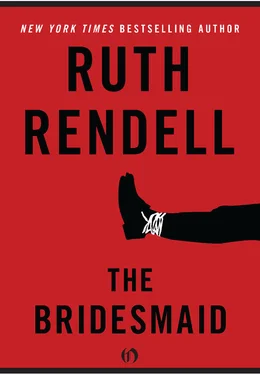Ruth Rendell - The Bridesmaid
Здесь есть возможность читать онлайн «Ruth Rendell - The Bridesmaid» весь текст электронной книги совершенно бесплатно (целиком полную версию без сокращений). В некоторых случаях можно слушать аудио, скачать через торрент в формате fb2 и присутствует краткое содержание. Год выпуска: 2010, Издательство: Open Road Integrated Media LLC, Жанр: Триллер, на английском языке. Описание произведения, (предисловие) а так же отзывы посетителей доступны на портале библиотеки ЛибКат.
- Название:The Bridesmaid
- Автор:
- Издательство:Open Road Integrated Media LLC
- Жанр:
- Год:2010
- ISBN:нет данных
- Рейтинг книги:3 / 5. Голосов: 1
-
Избранное:Добавить в избранное
- Отзывы:
-
Ваша оценка:
- 60
- 1
- 2
- 3
- 4
- 5
The Bridesmaid: краткое содержание, описание и аннотация
Предлагаем к чтению аннотацию, описание, краткое содержание или предисловие (зависит от того, что написал сам автор книги «The Bridesmaid»). Если вы не нашли необходимую информацию о книге — напишите в комментариях, мы постараемся отыскать её.
The Bridesmaid — читать онлайн бесплатно полную книгу (весь текст) целиком
Ниже представлен текст книги, разбитый по страницам. Система сохранения места последней прочитанной страницы, позволяет с удобством читать онлайн бесплатно книгу «The Bridesmaid», без необходимости каждый раз заново искать на чём Вы остановились. Поставьте закладку, и сможете в любой момент перейти на страницу, на которой закончили чтение.
Интервал:
Закладка:
So this was Mike Jacopo. Philip said, stammering a bit, “Are you—do you—do you live here?”
The woman said, “I’m Rita Pelham and this is my house. We’ve been away a bit lately with the competitions up north.”
He had no idea what she meant, but he understood this was Senta’s mother, or the woman she called mother, and Jacopo the young lover Fee had talked about. Confusion robbed him of words. All that mattered anyway was that she wasn’t here, she was out, she had gone to a party.
Jacopo had turned the sound up again. The tango played. They moved into each other’s arms, hands stiff, heads erect. Rita swayed backwards, in the loop of Jacopo’s arms, her grey hair sweeping the floorboards. Jacopo moved into the stylised steps of the dance. As they passed the door, he kicked it shut. They had forgotten Philip. He went out through the front door, pushed up the latch, closed the door behind him.
Tarsus Street was empty. The Rastafarian and the two white men had gone. So had the radio from his car, which he had left unlocked, and the raincoat from the backseat.
It was only when he was home and in bed that he thought how he should have stayed there. He should have sat in the car until she came back, all night if necessary. He hadn’t thought of it because the theft of his radio and the raincoat, which was a Burberry, which he had bought with his Visa card and still hadn’t finished paying for, had shaken him rather a lot. Perhaps he could have persuaded Rita Pelham or Jacopo to let him into Senta’s room and stay the night there. Of course they wouldn’t have agreed to that, of course not.
That Rita owned the house and lived there somehow changed the aspect of things. It meant that Senta, like him, lived at home with her mother. It wasn’t quite like that, he could see it wasn’t, but it was a similar state of affairs. Things somehow became less sordid when seen in that light. Senta lived with her mother; she wasn’t responsible for the decay of the place and the dirt and the smell.
He slept and dreamed of her. In the dream he was in her room, or rather he was inside the mirror, watching the room through the glass: the bed that was piled with purple pillows and quilt, the wicker chair with her discarded clothes on it, the shutters folded across the window, the door that led to those corridors and caverns of rubbish, closed and with a chair set against it. He sat inside the mirror and it was like sitting in a tank of greenish water in which tiny specklike organisms swam, in which thin green fronds faintly swayed and a crawling snail left its silver trail on the other side of the glass. She came into the room, forcing the door open and knocking the chair over. She came close up to the glass and looked into the green speckled translucence without seeing him; she didn’t even see him when their faces were pressed together with the wet glass between.
Out with Hardy in the morning, along Glenallan Close, round Kintail Way, and back by way of Lochleven Gardens, he met the postman who handed him his own mail. There was another postcard from Christine, though she was coming home today, and a letter for her from one of her sisters. The postcard was of a street in Newquay this time and said: “I may be home before you get this so won’t give you any news. The X is supposed to mark our room but Cheryl says it is wrong because we are on the third floor. Much love, Mum.”
Philip put Christine’s letter on the mantelpiece. They seldom got letters, any of them. The people they knew and their relatives phoned if they wanted to communicate. But why shouldn’t he write to Senta? He could type the envelope at work so that she wouldn’t know who it was from. Yesterday morning he wouldn’t even have considered this, but things had changed. Rita and Jacopo were there and they got letters. He had seen two envelopes lying by the phone when he looked through the letter box. If a letter came for Senta, one of them would probably take it down to her and she would at least open it. When she saw it was from him, would she throw it away?
Bereft of his radio, he was driven back onto his own thoughts as he drove down to the West End to the head office. The difficulty would be in knowing what to say to her that would stop her throwing it away. Philip hardly ever wrote personal letters. He couldn’t remember the last time he had, and he had never written a love letter, which this must be. Normally, when he put pen to paper or, more often, dictated something to Lucy, the typist he shared with Roy and two others, the result was on the lines of: “Dear Mrs. Finnegan, This is to confirm receipt of your cheque for a deposit on the agreed work in the sum of £1,000. If you have any queries, please do not hesitate to contact me at the above showroom at any time …” Still, he could write a love letter, he knew he could, phrases from the fullness of his heart and his longing were already coming to him, and he could apologise and beg forgiveness. He wouldn’t mind that, he wouldn’t find it humiliating. But she had asked him to prove his love for her….
Roy, still in a good mood, caught him doing the envelope on Lucy’s typewriter. “Writing your love letters on the company’s time now, I see.”
It was uncanny how near the bone people could get, and all unwittingly. Philip pulled the envelope off the roller. No doubt Roy really thought it was to Mrs. Ripple, for he said, “The order for that new bit of marble’s come through. Can you give the old bag a ring and tell her it’ll be with her by midday?”
He tried to do so on Lucy’s phone. The line was engaged for the first couple of attempts. While he waited, he had a look at Lucy’s Daily Mail, read a story about the IRA, one about a dog rescuing its owner from drowning in the Grand Union Canal, another which was an account of the murder of an old woman in Southall. He picked up the phone again and dialled Mrs. Ripple’s number.
“Hallo, who is it?”
Her voice came out of the receiver in a sharp blast, the sentence as if one polysyllabic word, not four. He told her who it was and passed on Roy’s message.
“About time too,” she said, and then, “I shan’t be here. I’m going out.”
He said he would get back to her. An idea had come to him out of the air, out of nothing, an idea of stupendous magnitude, a total solution. It felled him, so that he spoke to her in a tone of vagueness, hesitantly, unable to find the ordinary simple words.
“What did you say?”
He pulled himself together, said, “I have to talk to my colleague, Mrs. Ripple. With your permission, I’ll come back to you within five minutes.”
As if an observer or listener could read his thoughts, he shut the door. He picked up the newspaper again and looked once more at the account of the murder of the Southall woman. Why hadn’t he thought of this way out before? It was so simple, it was only another move in the game. For that was all it was to Senta, a game, but one that he also had to play. He even liked the idea of that, of a private secret game they both played, even when neither quite knew the truth of the other’s strategy. That only made it more exciting.
She was a fantasist who also told the truth about her own history. He still found that hard to get used to, but he knew it was an accurate analysis of her. Another aspect of her character was now revealed to him. She would want a lover—a husband? —to have an equally fantastic dream life. Even in the short time they had known each other, he might already have disappointed her by his failure to relate adventures and exploits of his own past. The point was that she would know he was inventing and expect him to do this. She did it herself, it was a way of life with her. He saw himself suddenly as stupid and insensitive. Because he had been too thick to respond to her invitation, a simple and innocent invitation to a shared fantasy, he had caused them all this misery, the worst ten days of his life.
Читать дальшеИнтервал:
Закладка:
Похожие книги на «The Bridesmaid»
Представляем Вашему вниманию похожие книги на «The Bridesmaid» списком для выбора. Мы отобрали схожую по названию и смыслу литературу в надежде предоставить читателям больше вариантов отыскать новые, интересные, ещё непрочитанные произведения.
Обсуждение, отзывы о книге «The Bridesmaid» и просто собственные мнения читателей. Оставьте ваши комментарии, напишите, что Вы думаете о произведении, его смысле или главных героях. Укажите что конкретно понравилось, а что нет, и почему Вы так считаете.











